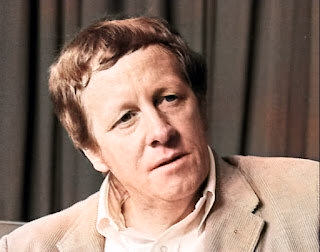Bryce Benno Rohde (pronounced Roe-dee) was born on September 12, 1923 in Hobart and moved to Adelaide when he was two where his family established Rohde's Homemade Cakes. Bryce attended Nailsworth Primary School and Unley High School. Both his parents were amateur singers and his mother Gertrude played piano, an instrument for which Rohde showed an early aptitude, studying classical music for seven years. Upon completing school he worked in the family bakery and began playing music professionally on the side.
During World War II, Rohde joined the army, and also met Barbara Coombe. They married in 1946, they had two sons, but the marriage was short-lived. During the war he encountered jazz and after the war he joined the Adelaide-based Alf Holyoak Sextet a Benny Goodman-style band, and became a credible jazz pianist the old-fashioned way: on the job.
In 1953 he and the vibraphonist/drummer Jack Brokensha headed for Canada at the suggestion of the multi-reeds player Errol Buddle, only to be jailed upon their arrival in Halifax with no funds and no means of support. They were bailed out by Buddle and the New Zealand drummer Don Varella, and settled in Windsor, Ontario, just across the border from Detroit. Initially little work came in, however, and in a 1982 interview for Jazz magazine, Buddle told Eric Myers: ''One night for dinner I remember we had between the four us enough money for three apples and half a loaf of bread''.
Eventually they fell into work in Detroit’s leading jazz club, the Rouge Lounge, backing a singer called Chris Connor. When she left town the club owner, Ed Sarkesian, stuck with what soon became known as The Australian Jazz Quartet (AJQ). Besides Rohde on piano, Buddle on tenor saxophone and bassoon and Brokensha on vibes and drums it had an American, Dick Healy, playing alto saxophone, flute and bass. The different sound combinations set the band apart, with Buddle’s bassoon being a source of particular notoriety. Sarkesian spoke to the American Booking Corporation’s president, Joe Glaser (who managed Louis Armstrong and represented Miles Davis, Dave Brubeck, Gerry Mulligan, Stan Getz, Chico Hamilton and George Shearing), and Glaser liked what he heard. Initially they were sent out backing singers, including Helen Merrill and Carmen McRae, before becoming a drawcard themselves.
''From then on we just worked consistently and recorded consistently, and people liked the sound combination'' Rohde told Jim McLeod for his 1994 book, Jim McLeod’s Jazztrack (ABC). ''We used to go out on 30-day bus tours and do one-nighters. A bus full of all these wonderful, famous people. I wish I’d paid more attention. I was just having too good a time''.
They played their very cool-school jazz from colleges to dives to the most prestigious theatres, including Carnegie Hall. In 1955 the constraint of not having a bass when Healy played reeds saw them add firstly Jimmy Gannon, then Jack Lander, and finally Ed Gaston on bass, turning them into Australian Jazz Quintet, a guise in which they worked and recorded solidly through the rest of the 1950s. Buddle told John Clare for his book Bodgie Dada and the Cult of Cool (UNSW Press, 1995) that they were the fifth-highest plaid jazz band in the US, after Armstrong, Brubeck, Mulligan and Shearing.
In 1958 they accepted an offer to do a capital-city tour of Australia, which, with Buddle having announced that he would like to resettle in Australia, would be the AJQ’s swansong. They played some farewell US concerts and then caught a ship in San Francisco. The Australian tour went well, even if the scale of the band’s success in the US had barely registered on the Antipodean radar. Rohde settled in Sydney and formed the Bryce Rohde Quartet. Along with being a mainstay at the El Rocco the quartet toured nationally supporting the Kingston Trio, during which Rohde discovered George Russell's hugely influential book on improvisation, The Lydian Chromatic Concept of Tonal Organization. From the moment he opened it he was a convert, and in turn converted bassist Bruce Cale and formed an exceptional band with Cale, Charles Munro (reeds) and Mark Bowden (drums).
During the 60s Bryce Rohde released a number of albums:Bryce Rohde Quartet In Concert (Coronet 1960), Straight Ahead! (CBS 1962), Corners (CBS 1963), Big 'N Bryce (CBS 1964) and Just Bryce! (CBS 1965). In 1964 Rohde married Valerie Manning and in the following year they moved to California, where he led bands, worked as a sideman, taught, and occasionally recorded. The marriage ended amicably in the 1970s. In the early 1990s the AJQ reformed for an Australian tour and Rohde published Turn Right At New South Wales: The Collected Compositions of Bryce Rohde. One of those, the gorgeous ''Windows of Arques'', was the theme of Jim McLeod's Jazztrack on ABC Classic FM for three decades. Rohde's last Australian performance was at the 2003 Wangaratta Jazz Festival.
Rohde's playing and compositions shared a flair for elegance and restraint, and his touch at the piano generated a muted luxuriance. Despite a stroke in 2014 he continued to play until he died in his sleep at home in San Francisco in 2016.
''Para Ti (Just For You) / Warmer'' 1963 CBS
''Snowflakes / Frostbite'' 1964 CBS
ALBUMS
'Bryce Rohde Quartet In Concert' 1960 Coronet
'Straight Ahead' 1962 Coronet
'Corners' 1963 CBS
'Big 'n' Bryce [with Big Miller] 1964 CBS
'Just Bryce' 1965 CBS
'More Spring' [Featuring Charlie Munro] 1990 MBS Jazz
References
John Shand



No comments:
Post a Comment